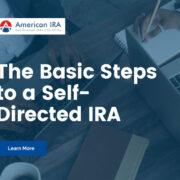The Power of Self-Directed IRA Investing
The Power of Self-Directed IRA Investing
Retirement planning can seem overwhelming, but with the right tools and information, it’s possible to create a comfortable nest egg for your golden years. One tool that has gained popularity in recent years is the Self-Directed IRA. This type of retirement account offers individuals the freedom to invest in a wide range of assets beyond traditional stocks and bonds. In this blog post, we’ll explore the power of Self-Directed IRAs and how they can help you diversify your retirement portfolio.
First Things First: What Does a Self-Directed IRA Offer?
A Self-Directed IRA is an individual retirement account that allows you to invest in a broader range of assets, such as real estate, private equity, precious metals, and more. Self-Directed IRAs are governed by the same IRS rules and regulations as traditional IRAs. However, they require a custodian to hold and administer the assets on behalf of the account owner. The custodian is responsible for handling all the administrative tasks associated with the account, but you will, as always, be responsible for filing your own taxes.
What are the Specific Benefits of Self-Directed IRAs?
It’s hard to talk about the power of Self-Directed IRAs without listing some of the benefits. Let’s look at some of the most common ones:
- Diversification: One of the most significant benefits of a Self-Directed IRA is the ability to diversify your retirement portfolio beyond traditional stocks and bonds. By investing in alternative assets, you can reduce your portfolio’s overall risk and potentially increase your returns.
- Control: With a Self-Directed IRA, you have more control over your investment choices. You can choose investments that align with your investment goals, risk tolerance, and personal preferences. This level of control can help you make better investment decisions and achieve your retirement goals more effectively.
- Tax Advantages: Like traditional IRAs, Self-Directed IRAs offer tax advantages. Contributions to a Self-Directed IRA are tax-deductible, and earnings grow tax-free until you withdraw them in retirement. This tax-deferred growth can help your retirement savings grow faster.
The Challenges of Self-Directed IRAs
While Self-Directed IRAs offer many benefits, they also come with some challenges. After all, you’ll have more freedom with a Self-Directed IRA, which can be a bit of an adjustment. One of the most significant challenges is the complexity of investing in alternative assets. Unlike traditional stocks and bonds, alternative assets may require more due diligence and expertise to evaluate and manage effectively.
Opening Your First Self-Directed IRA
If you’re interested in opening a Self-Directed IRA, there are a few steps you’ll need to take. First, you’ll need to find a reputable custodian that specializes in Self-Directed IRAs. The custodian will help you set up your account, transfer your existing retirement funds, and manage your account.
Next, you’ll need to decide what types of alternative assets you want to invest in. Self-Directed IRAs can invest in a wide range of assets, including real estate, private equity, precious metals, and more. It’s essential to do your due diligence and research any investments thoroughly before investing, as this is ultimately your decision—the Self-Directed IRA administration firm is simply carrying out the orders you place.
Finally, you’ll need to manage your Self-Directed IRA investments actively. You’re in charge, after all. That means the decisions are up to you. Unlike traditional IRAs, which are often managed passively through mutual funds and index funds, Self-Directed IRAs often require more hands-on management. This means staying up to date on market trends, evaluating your investments regularly, and making adjustments as needed. (Of course, you can also build a conservative, passive portfolio—it’s all up to you.)
Self-Directed IRAs can be a powerful tool for diversifying your retirement portfolio and achieving your retirement goals. However, they require more due diligence, expertise, and management than the traditional approach to retirement. Interested in learning more about Self-Directed IRAs? Contact American IRA, LLC at 866-7500-IRA (472) for a free consultation. Download our free guides or visit us online at www.AmericanIRA.com.








